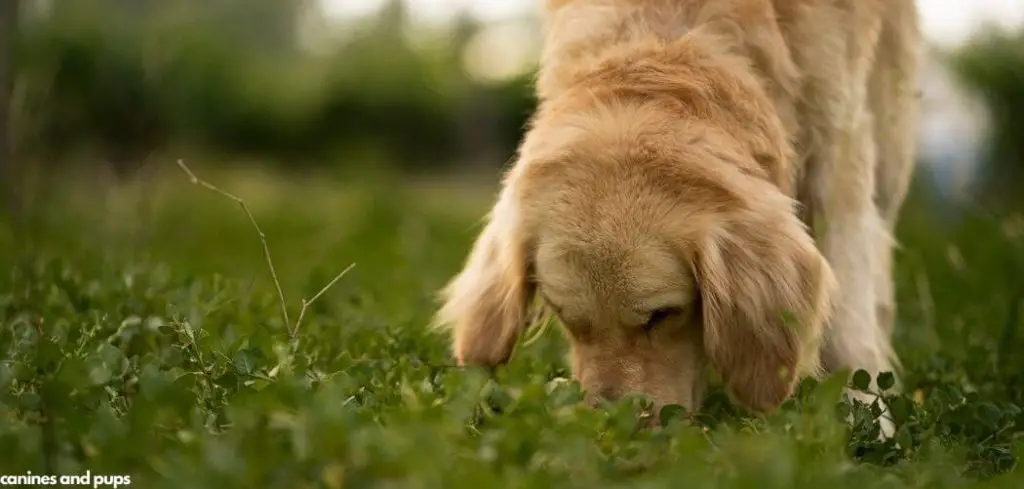It can be concerning when your dog shows little interest in their regular food but eagerly munches on grass.
Many dog owners wonder if this is a sign of illness, nutritional deficiency, or just quirky behavior.
We outline the common reasons for a dog only wanting to eat grass, what you can do at home, and when to seek veterinary help.
Dog Only Wants to Eat Grass — Why It Happens
A dog only wanting to eat grass can happen for a variety of reasons ranging from simple behavior to underlying medical issues. Some dogs eat grass out of boredom or habit, while others do it because of an upset stomach or digestive discomfort. In certain cases, a nutritional imbalance, parasites, or even anxiety can drive the behavior.
While occasional grass eating is often normal, a dog ignoring their regular food and obsessively eating grass can signal something more serious that needs veterinary attention.

Dog Only Wants to Eat Grass: Common Causes
Upset Stomach or Nausea
One of the most common reasons a dog only wants to eat grass is digestive upset. Dogs may instinctively chew grass to help soothe nausea or to trigger vomiting.
If your dog frequently vomits after eating grass, it could be their way of dealing with stomach irritation.
While a single episode may not be alarming, repeated patterns can point to gastritis, dietary intolerance, or more serious gastrointestinal problems.
Read more: Dog Only Eating Treats (Here’s Why)
Nutritional Deficiencies
Sometimes a dog seeks out grass because their diet is lacking in fiber, minerals, or other nutrients.
Commercial dog foods are typically balanced, but picky eaters, dogs on homemade diets, or those with absorption issues may crave plant matter as a supplement.
If your dog shows ongoing interest in grass over food, it could be a sign their diet needs adjusting.
Parasites or Gastrointestinal Infections
Intestinal parasites such as worms or protozoa can cause stomach discomfort, leading dogs to chew grass as a coping mechanism.
Infections from bacteria or viruses may also irritate the digestive tract. Dogs with parasites often show additional symptoms such as weight loss, diarrhea, or a dull coat.
This makes a vet check-up and stool test important if your dog’s grass eating seems excessive.
Behavioral Reasons
For some dogs, eating grass is simply a matter of habit, boredom, or curiosity. Dogs left alone outside or those without enough mental stimulation may graze on grass to pass the time.
This can become more noticeable if they are uninterested in their food but find chewing grass rewarding.
Ensuring they have adequate exercise, play, and enrichment can help redirect the behavior.
Anxiety or Stress
Stress-related behaviors are common in dogs, and grass eating can serve as a self-soothing activity.
A dog experiencing separation anxiety, environmental changes, or loud noises may chew grass as a calming outlet.
If your dog is avoiding meals but heads straight for grass when anxious, it may indicate emotional distress that needs to be addressed.
Underlying Medical Conditions
Serious health conditions such as pancreatitis, inflammatory bowel disease, or even early stages of kidney or liver problems can cause nausea, appetite changes, and grass eating.
Dogs with chronic illness may find grass more appealing than their food due to taste changes or discomfort when eating.
A veterinarian can run tests to rule out medical causes when grass eating is persistent.
What to Do If Your Dog Only Wants to Eat Grass
If your dog is otherwise healthy, occasionally eating grass may not be a big concern. However, when grass replaces their food, you’ll want to take steps at home.
Start by reviewing their diet to ensure it is complete and balanced. Switching to a higher-fiber food or adding safe vegetables may help if your dog is craving roughage.
Make sure your dog is mentally and physically stimulated. Provide interactive toys, longer walks, or training sessions to reduce boredom and anxiety.
Keep your yard free from pesticides, fertilizers, or chemicals, as these can make grass dangerous if eaten.
If parasites are suspected, ask your vet about stool testing and deworming options.
Monitor for other symptoms like vomiting, diarrhea, or weight loss. While you can encourage your dog to eat by warming up food, offering a different protein source, or hand-feeding, persistent disinterest in meals needs veterinary evaluation.
When to Call or Visit Your Vet
You should contact your veterinarian if your dog only wants to eat grass and is consistently refusing food.
This is especially important if you notice vomiting, diarrhea, lethargy, or signs of pain. Refusal to eat for more than 24 hours in an adult dog, or 12 hours in a puppy, is a red flag.
Also seek veterinary help if your dog’s grass eating is compulsive or if they are eating large amounts. If their grass consumption is accompanied by sudden weight loss, changes in thirst, or abnormal stools, underlying illness could be the cause. Trust your instincts—if something feels off, a check-up is the safest choice.
Read more: Dog Only Eats Cheap Food (Here’s why)
Key Takeaway
A dog only wanting to eat grass may be acting on instinct, trying to ease digestive upset, or signaling an underlying issue. Occasional grazing is usually harmless, but when it replaces normal eating habits, it becomes a concern.
By monitoring your dog’s behavior, ensuring a balanced diet, and involving your vet when needed, you can protect their health and well-being.
Always take persistent appetite changes seriously, as they are often the first clue to a bigger problem.
